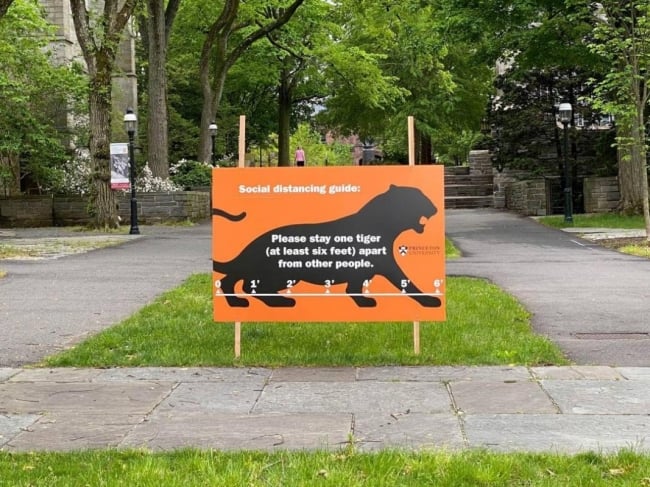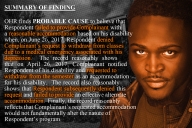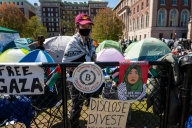You have /5 articles left.
Sign up for a free account or log in.

Signage on Princeton University's campus is designed to reinforce social distancing policies.
Laurel Masten Cantor, Princeton Office of Communications
As college leaders move ahead on plans to reopen their campuses this fall, it is becoming more clear that they lack confidence in their ability to control student behavior that can spread the coronavirus.
In addition to plans to regularly test students for COVID-19, college administrators are putting faith in conduct codes and written pledges that mandate students refrain from large gatherings, follow social distance guidelines and wear face masks. The administrators are setting up clear expectations for how students must conduct themselves and getting the message out through campus health campaigns and online training modules. What is less clear is how far colleges can go beyond their gates to enforce healthy behavior, which some students have already proven they are not willing to engage in.
Coronavirus outbreaks among fraternity members at both the University of California, Berkeley, and the University of Washington this month reinforced faculty members’ concerns that students will not follow social distancing protocols and bans on large gatherings when returning to campuses in the fall. The UW Interfraternity Council, which is comprised of 25 fraternity chapters with houses off campus, is continuing to battle a “cluster” of COVID-19 cases among members that began in late June, a release from the university said. The outbreak reached 136 confirmed cases among fraternity house residents on July 10, and nine other students who were in close contact with fraternity members were also infected, the university reported.
UC Berkeley officials also directly connected an increase of 47 new COVID-19 cases last week, mostly among undergraduate students, to parties in the university’s Greek life system, according to a July 8 message to the campus from Anna Harte, medical director of health services, and Guy Nicolette, assistant vice chancellor. The message included a gloomy outlook on the upcoming fall semester, when the university intends to bring more students back to campus, and Harte and Nicolette urged students not to attend large gatherings or parties.
“At the rate we are seeing increases in cases, it’s becoming harder to imagine bringing our campus community back in the way we are envisioning,” the message said.
College leaders’ doubts about enforcing social distancing are evident in a recent survey conducted by EAB, an education research and consulting firm. Seventy-two percent of survey respondents, which included vice presidents of student affairs and presidential chiefs of staff at 69 four-year institutions, said one of their top concerns related to social distancing in the fall is “motivating” students who live in residence halls to follow guidelines, according to the survey report. Nearly one-third of respondents said they had “high” confidence in their institutions’ ability to educate and promote social distancing among undergraduate students, while about 60 percent said they had “high” confidence in their ability to reinforce these practices among faculty members.
Hailey Badger, a senior analyst with EAB’s Student Affairs Forum who helped conduct the survey in early June, said leaders who responded expressed particular concern for enforcing social distancing in off-campus areas that they cannot closely monitor, such as private apartments or homes, which in many cases include fraternity and sorority chapter houses. Strategies proposed to reach these students include behavioral pledges or social media campaigns that reinforce expectations and the importance of following public health guidelines, Badger said.
“They’re putting a lot of effort into campus social norms,” Badger said. “That’s what they think is going to be effective in harder-to-monitor areas … Using influential students to be the face of social media campaigns, hosting conversations with student affairs leaders, strategies that will hopefully reinforce that ‘this is what my peers are doing. I should also do that because it’s what my peers are doing.’”
Student affairs and health officials have used the “smoke-free campus” initiative widely used on college campuses as a model approach for a health promotion campaign about preventing the spread of coronavirus. One stark difference is that the smoke-free campaign took decades to achieve widespread compliance, while current coronavirus prevention efforts ask students to “pivot on a dime” in a matter of months, said Sarah Van Orman, chief student health officer for the University of Southern California.
It will be important for these public health campaigns to identify the direct impact that compliance with guidelines has on keeping campuses open but also recognize the sacrifices students are making, she said.
“Institutions have to empathize with what we’re asking students to give up,” said Van Orman, who is also a member of the COVID-19 task force for the American College Health Association. “These measures themselves are not without consequences: disrupted education, emotional and social isolation.”
She said it will also be important for campuses to come up with enforcement measures for noncompliance. A feasible university response to students who violate expectations is to remove or ban them from campus, she said.
With about 47,000 students enrolled at USC and many of them living in private residences, Van Orman acknowledged that the university will not be able to monitor off-campus behavior or control what occurs in private residences. But she said the university will send out “strong messaging” about safe behavior to students who live in areas patrolled by campus police and will also be watchful of gatherings related to student organizations.
“When our students engage in events off campus, it spreads among the student body and it spreads to our on-campus locations,” Van Orman said of coronavirus infections. “Enforcement is critical, but it’s not going to get us all the way there. We need our communities to embrace this and comply because it’s the right thing to do.”
About 40 percent of college leaders responding to the EAB survey said they would ask students to sign agreements to follow university and public health guidelines. Seventeen percent of respondents said they were updating codes of conduct policies "to incorporate social distancing and/or quarantine violations," and 37 percent said they were considering making such changes, the survey report said.
Several Ivy League institutions that released their fall reopening plans earlier this month published what they variously referred to as a “community compact,” “social contract” or “behavioral compact,” which ask students to abide by public health guidelines, including agreeing to be frequently tested for the virus, staying six feet apart from others and wearing a mask while in shared campus spaces.
Cornell University said in its action plan for students that “all students who will be in Ithaca for the fall semester” are required to sign its compact, and that additional requirements will be established for students who live in residence halls. Harvard’s agreement is solely aimed at students in its residential college.
Princeton University’s social contract for undergraduate students states that “while on campus,” students will participate in mandatory monitoring and testing and agree not to host in-person gatherings. Violations of the contract could result in a disciplinary process, or students being removed from on-campus housing, according to Princeton’s fall 2020 plan. Harvard’s compact also said violations could result in a student’s removal from campus.
“Students who are unwilling or unable to comply with the restrictions in the social contract should not come to campus,” Princeton’s plan states.
The University of Colorado at Boulder, a public institution that has already had difficulties with students flouting local public health recommendations at off-campus gatherings this summer, has added a section to its student code of conduct that enforces university requirements and orders from public health officials related to the spread of coronavirus. It states that “off campus gatherings, public or private” must abide by the most strict policy in place by local jurisdictions, while on-campus gatherings will also need to comply with the current university policy.
Laura Beltz, senior program officer for policy reform at the Foundation for Individual Rights in Education, said the civil liberties watchdog will be monitoring campus policies that place new, unreasonable restrictions on the time, place and manner of student speech or expression. Parties wouldn’t necessarily fit into this category of “protected” activity, especially if they violate public health ordinances intended to keep the community safe, but it may not be the university’s place to enforce such ordinances, she said.
Beltz praised CU Boulder's use of careful language in an appendix to the university’s code of conduct that “strongly encouraged” students to “take personal responsibility” for their health and that of others. It included information about the risks of coronavirus and current state and local guidelines in Colorado and the city of Boulder. Beltz said it will be important for campus officials to draw a clear line between what’s required and recommended and allow space for policies to be updated as guidelines shift in the future, Beltz said.
“Things that are presented as guidelines aren’t written very clearly,” she said. “Even if it’s not mandatory, it can seem so to a student reading it. It’s going to be important that that’s communicated.”








